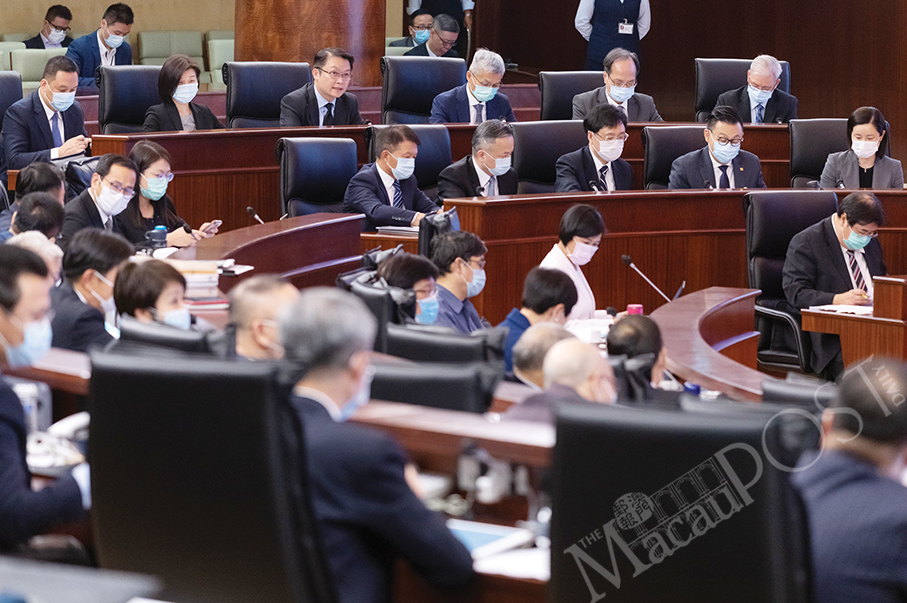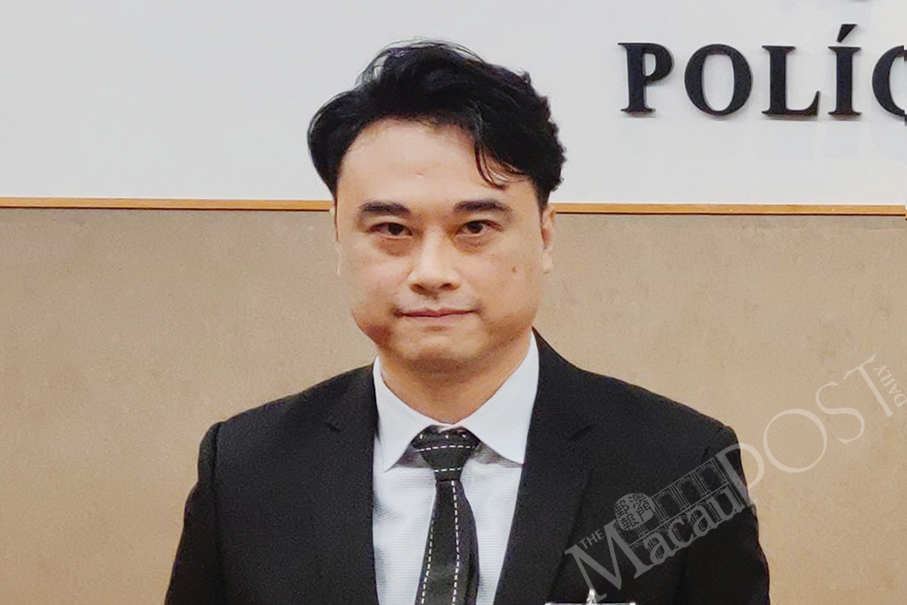Secretary for Economy and Finance Lei Wai Nong has announced that the government has decided to give residents their annual “wealth-sharing” handout in cash next year – as in previous years.
Lei made the announcement during a one-day Q&A session in the legislature’s hemicycle on Friday about his portfolio’s policy guidelines for next year.
The policy secretary said that the government has made the decision after listening to residents’ opinions about the way the handout should be paid next year.
The 2021 Policy Address, which Chief Executive Ho Iat Seng delivered in the legislature’s hemicycle on November 16, stated that next year’s amount of the government’s annual “wealth-sharing” handout will remain unchanged at 10,000 patacas for permanent residents and 6,000 patacas for non-permanent residents, but it also noted that “the form of distribution will depend on the circumstances”.
During a post-policy address press conference later that day, Ho said that the government was open to listening to residents’ opinions about which way they would prefer to receive the handout next year, in cash as in previous years or as a top-up to their consumption subsidy smartcards.
The cash handout has been paid out by the government annually since 2008, when each permanent resident received 5,000 patacas while each non-permanent resident received 3,000 patacas. Since then, the amount had been gradually raised, before it reached 10,000 patacas for permanent residents and 6,000 patacas for non-permanent residents last year.
This year’s amount of the handout – which was paid to residents earlier this year – remained unchanged at 10,000 patacas for permanent residents and 6,000 patacas for non-permanent residents.
The first phase of the government’s consumption subsidy scheme, a 3,000-pataca consumption smartcard, ran between May and July, while the ongoing second phase of the scheme, a 5,000-pataca top-up, is running between August and next month. The scheme was launched with the aim of boosting the local economy and stabilising employment. The cards are known as “siufai kat” in Cantonese.
Replying to questions from a number of lawmakers about the government’s decision on the way of distributing next year’s “wealth-sharing” handout, Lei said that “after listening to opinions from various segments [of civil society], the [Macau] Special Administrative Region government has decided to pay out its wealth-sharing handout in cash [next year]”.
“This can solve the question [how to pay out the handout next year] that everybody had been discussing. It is unnecessary for us to cause an impasse in civil society due to this question, and we have to move forward,” Lei said, adding that the “formula” for Macau’s successful fight against the novel coronavirus disease consisted of the “unity” among its residents.
Lei urged residents to spend as much as possible of next year’s cash handout in Macau, thereby supporting small- and medium-sized enterprises (SMEs) in particular and keeping people’s jobs. Lei said that this was a way of “supporting yourself and your friends”.
“If the 10,000 patacas [to be received by each permanent resident] is injected into the market, it will surely have a positive effect on the market,” Lei said, adding that “our consumption is directly related to our rice bowl”.
GDP set to fall over 50 pct
The policy secretary also said that in its latest estimate the government expected Macau’s gross domestic product (GDP) to fall around 56 percent this year, adding that while the estimate “will be constantly adjusted” the government predicted that this year’s economy would contract over 50 percent.
Lei said that Macau’s economy was on track to recover as it’s now gradually entering a phase of attracting tourists again, following a phase which was focused on boosting local demand early this year.
Despite the fact that the number of visitor arrivals to Macau has been lower than expected since the resumption of the Individual Visit Scheme (IVS) for all mainlanders to travel to Macau on September 23, it “nevertheless marked a turning point” in the city’s economic recovery, Lei said.
Lei also said that domestic demand was still able to support Macau’s economy, pointing out that the domestic market currently accounts for 66 percent of GDP.
According to officials statistics released earlier this month, Macau’s GDP for the first three quarters of this year declined 59.8 percent year-on-year in real terms.
Lei underlined that what the government could do for the time being is to stimulate the domestic market by adopting an “active fiscal policy” and increasing its investment in public projects.
Lei also said that the government would keep an open mind on the possibility of launching a third round of financial support measures next year, but only in special circumstances.
COVID-19 prevention & economic recovery
In his introductory speech about his portfolio’s policy guidelines for next year, Lei said that he expected the government’s COVID-19 prevention and control measures to be “normalised” next year, adding that protecting residents’ lives and health would remain the government’s top priority.
Macau has recorded 46 novel coronavirus cases since late January, 44 of which have been classified as imported, while two cases have been classified as “connected to imported cases”. The 46 patients have all been cured and discharged from hospital, and no fatalities have been reported in Macau, which has been spared a community transmission of the novel coronavirus disease. Macau has not confirmed a new COVID-19 case for 156 days.
With the aim of continuing to adhere to its strict COVID-19 prevention and control work while resuming Macau’s economic activities, the government would do its utmost to look for the best solutions possible “amidst the limitations” in order to boost the recovery of the city’s economy, Lei said.
‘Tourism+’
In his speech, Lei said that next year the government would “sort out” the relationship between the city’s tourism, gaming, MICE industry (meetings, incentives, conferences and exhibitions) and other emerging industries, aiming to encourage the joint and healthy development of the gaming and tourism sectors.
Lei underlined the importance of sports tourism as an important component of tourism nowadays. He said that “tourism + sports” was a new way to cater for the needs of the urban middle class.
The policy secretary also noted that Macau’s MICE sector has been gaining international recognition, adding that the government would promote cooperation between the Macau Government Tourism Office (MGTO) and the Trade and Investment Promotion Institute (IPIM) in an effort to attract more high-end business travellers through the “tourism + conventions and exhibitions” concept.
MGTO is set to be transferred from the Secretariat for Culture and Social Affairs to Lei’s portfolio, which supervises the gaming sector, soon. Tour guides says that gaming and shopping continue to be Macau’s main tourist attraction.
Lei also underlined Macau’s double status as a UNESCO-recognised World Heritage Site and UNESCO-designated Creative City of Gastronomy, adding that e-sports and e-commerce could also expect to have great development potential in Macau.
Lei also called for cross-border integration of “tourism+” and the importance of developing tourism derivatives to create synergies catering for specific visitor groups’ travel, shopping and entertainment needs. He said that the government would continue to focus on promoting Macau’s image as a destination that is also “healthy and safe” during the COVID-19 pandemic.
“Next year, we hope to combine various components such as e-commerce, events, culture, sports, food, shopping and entertainment to form a synergy to enrich the tourism experience, strengthen the cultural tourism brand and make tourists feel worthwhile to come to Macau again,” Lei said when replying to questions from several lawmakers about the “tourism+” concept.
The policy secretary described Macau’s culinary landscape as one of the tourism industry’s trump cards, pointing that that there are 19 Michelin restaurants in Macau and more than 100 stores with special local features.

Secretary for Economy and Finance Lei Wai Nong (third from left, upper row, not wearing a facemask) speaks during Friday’s Q&A session about his portfolio’s 2021 policy guidelines in the Legislative Assembly’s (AL) hemicycle. Photo: GCS









